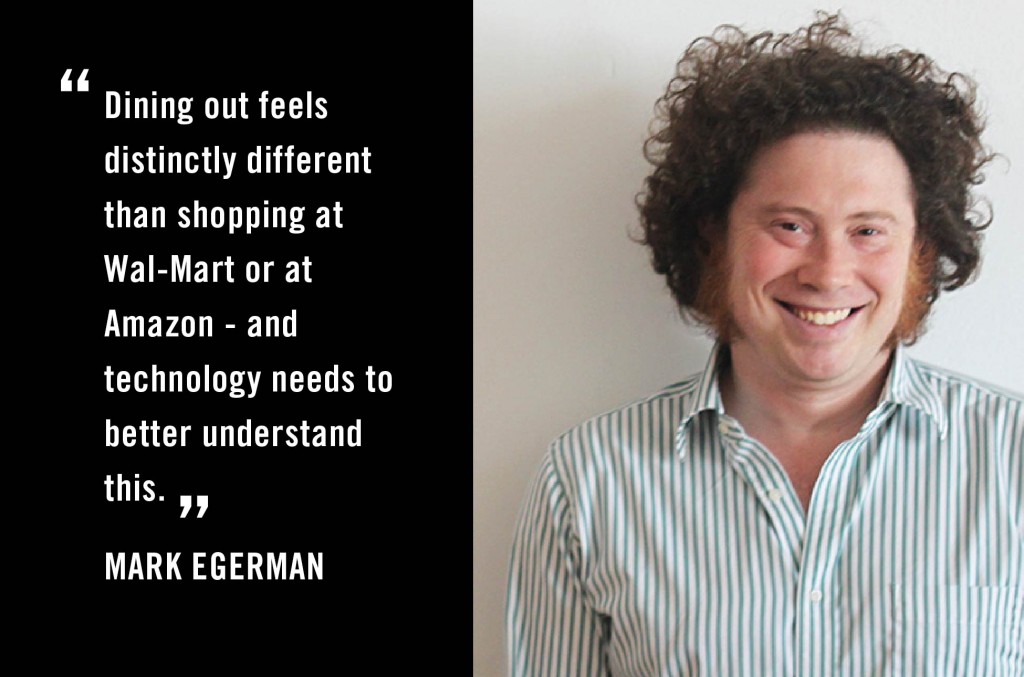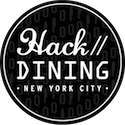Guest post by Mark Egerman, co-founder, Cover. The views expressed here are solely those of the author and do not reflect the views of Food+Tech Connect.
The future of dining revolves around better guest experiences – and too often those who build technology for restaurants have failed to place the dining experience at the center of their products. Information and technology can certainly be used to improve restaurant operations – improving the guest experience is more difficult.
Ordering from your phone, sharing reviews of individual dishes, demand-based pricing, direct feedback to managers, tablets on tables, gamification – these may initially appeal to consumers, but in the end they may undermine the soul of the dining experience. Each one can be a distraction from what matters – your meal and the company you’re sharing it with, and the atmosphere that brings you all together.
These new efforts are simultaneously squeezing attention from diners and dollars from restaurateurs. The industry is rightfully skeptical of efforts to capture additional potential revenue by auctioning tables, monetizing loyalty programs, or daily deals. We live in a post-Groupon era and plenty of blood has been shed. These and other initiatives are often a form of toxic debt, short-term cash infusions that come at the long-term health of your restaurant. And the damage is delivered by a simple mechanism: they make dining feel less personal and more transactional.
We go to restaurants to share culinary experiences, not stare at our screens. The future of dining does not resemble the Jetsons, with robots instead of servers, 3D printers instead of chefs, and each diner having ten different dining apps on their phone for each restaurant they go to. These won’t work because they misunderstand hospitality.
Hospitality transforms a commercial exchange of money for goods and services. Dining out feels distinctly different than shopping at Wal-Mart or at Amazon – and technology needs to better understand this. If you make me checkout on my phone at the end of the meal you’ve shattered this transformation. If you send me push notifications throughout my meal, you’re breaking the core of hospitality. Diners want to know where their food comes from – but they don’t need to be taken out of the moment and distracted with ads and games to monetize that knowledge.
We founded Cover because we believe technology can make dining feel less transactional and more personal. And this is the future of dining. Your cell phone is this incredible computer with instant access to all of the world’s information. And it should remain in your pocket or purse while you eat. After you’ve had a great meal, you should be able to leave on a high note.
Each year it feels like the opportunities for distractions multiply and the oases of calm shrink. Restaurants are one of the last places where people can sit down, be taken care of, and enjoy themselves. There’s no reason to believe that the future of dining will abandon its core principle.
Hacking Dining is online conversation exploring how we might use technology and design to hack a better future for dining. Join the conversation between June 2-30, and share your ideas in the comments, on Twitter using #hackdining, Facebook, LinkedIn or Tumblr.
________________
 Mark is the Co-Founder of Cover, http://www.paywithcover.com. Cover is the leading mobile payment system for restaurants and works with over 100 restaurants to provide the best possible experiences for diners. Prior to founding Cover, Mark was a mobile payments lead for the federal government, working for Elizabeth Warren at the Consumer Financial Protection Bureau. He’s a graduate of Carnegie Mellon and Harvard Law School.
Mark is the Co-Founder of Cover, http://www.paywithcover.com. Cover is the leading mobile payment system for restaurants and works with over 100 restaurants to provide the best possible experiences for diners. Prior to founding Cover, Mark was a mobile payments lead for the federal government, working for Elizabeth Warren at the Consumer Financial Protection Bureau. He’s a graduate of Carnegie Mellon and Harvard Law School.




